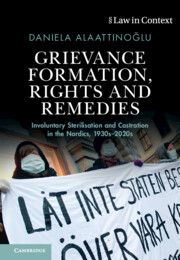 Grievance Formation, Rights and Remedies
Grievance Formation, Rights and Remedies Involuntary Sterilisation and Castration in International Law
from Part II - A Question of Rights?
Published online by Cambridge University Press: 18 August 2023
This chapter shows how involuntary sterilisation and castration have become problematised in international law. The chapter discusses the rise of international law and human rights in the post-war context. Despite being regarded as international crimes on meeting certain criteria since the Nuremberg trials, the interventions are rarely prosecuted in practice. Efforts to mainstream involuntary sterilisation as human rights violations have been more successful. This development began in the 1990s and has since gone from soft law to binding legal obligations. The chapter shows that uncertainty prevails regarding the legal and remedial conceptualisation of involuntary sterilisation and castration in international human rights law due to inconsistent and incidental treatment of such cases. Ultimately, the argument is made that international law provides a socio-legal master frame for national legal claims. In the case of involuntary sterilisation and castration, however, this master frame is not sharply defined, effectively impeding investigation and problematisation of the practices in national contexts.
To save this book to your Kindle, first ensure [email protected] is added to your Approved Personal Document E-mail List under your Personal Document Settings on the Manage Your Content and Devices page of your Amazon account. Then enter the ‘name’ part of your Kindle email address below. Find out more about saving to your Kindle.
Note you can select to save to either the @free.kindle.com or @kindle.com variations. ‘@free.kindle.com’ emails are free but can only be saved to your device when it is connected to wi-fi. ‘@kindle.com’ emails can be delivered even when you are not connected to wi-fi, but note that service fees apply.
Find out more about the Kindle Personal Document Service.
To save content items to your account, please confirm that you agree to abide by our usage policies. If this is the first time you use this feature, you will be asked to authorise Cambridge Core to connect with your account. Find out more about saving content to Dropbox.
To save content items to your account, please confirm that you agree to abide by our usage policies. If this is the first time you use this feature, you will be asked to authorise Cambridge Core to connect with your account. Find out more about saving content to Google Drive.